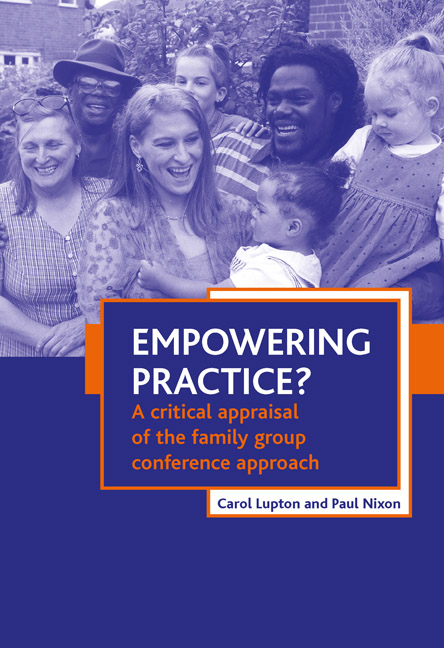Book contents
- Frontmatter
- Contents
- Preface
- Acknowledgements
- Introduction
- one The dilemmas of empowerment
- two Partnership and empowerment in children’s services
- three Lessons from New Zealand
- four Empowering professionals?
- five International perspectives
- six Empowerment in process?
- seven Assessing outcomes in child welfare
- eight Empowering outcomes?
- nine Conclusion
- Bibliography
- Index
three - Lessons from New Zealand
Published online by Cambridge University Press: 05 July 2022
- Frontmatter
- Contents
- Preface
- Acknowledgements
- Introduction
- one The dilemmas of empowerment
- two Partnership and empowerment in children’s services
- three Lessons from New Zealand
- four Empowering professionals?
- five International perspectives
- six Empowerment in process?
- seven Assessing outcomes in child welfare
- eight Empowering outcomes?
- nine Conclusion
- Bibliography
- Index
Summary
Introduction
One culture can learn much from another about childhood, parenting, education and family life. Diversity of culture is enriching and different cultural and ethnic values and family forms are sources of strength. (Race Equality Unit, 1990, p 2)
At the same time as the 1989 Children Act was being drafted in England and Wales, similar legislation was being finalised in New Zealand. Both enshrined much the same principles, but the 1989 New Zealand Children, Young Persons and their Families Act (CYPFA), provided a far more radical mechanism for enacting those principles than the UK Children Act. Both Acts were heralded at the time as a challenge to the old order and sought fundamentally to re-evaluate the relationship between the family and the State. Thus, in the UK, the arrival of the Children Act was described by Lord Mackay, then Lord Chancellor, as: “… the most comprehensive and far-reaching reform of child law which has come before Parliament in living memory” (Hansard, 1998, vol 502, col 488). In New Zealand, the report strongly influencing the legislative reform – Puao-Te-Ata-Tu – was described by Anne Hercus, Minister for Social Welfare, as: “The most significant document ever presented to the Department and Social Welfare” (quoted in Wilcox et al, 1991, p 3).
In particular, both Acts sought to keep children with their family of origin where possible and placed emphasis on supporting rather than replacing existing families. Both envisaged a central role for families as carers and decision makers. However, while the theme of partnership within the Children Act was implicit, contained not in the body of the law itself but in the volumes of guidance and regulations by which it was accompanied, the New Zealand law involved a far more central requirement, explicit within the primary legislation, to work collaboratively with the families involved. The practical manifestation of this requirement was the family group conference (FGC). This chapter will examine the sociopolitical factors surrounding the CYPFA and consider its main objectives. The nature of FGCs, and the central values and assumptions by which they are underpinned, will be described and assessed and some of central issues and debates raised by their operation in the New Zealand context will be discussed.
- Type
- Chapter
- Information
- Empowering Practice?A Critical Appraisal of the Family Group Conference Approach, pp. 53 - 70Publisher: Bristol University PressPrint publication year: 1999



